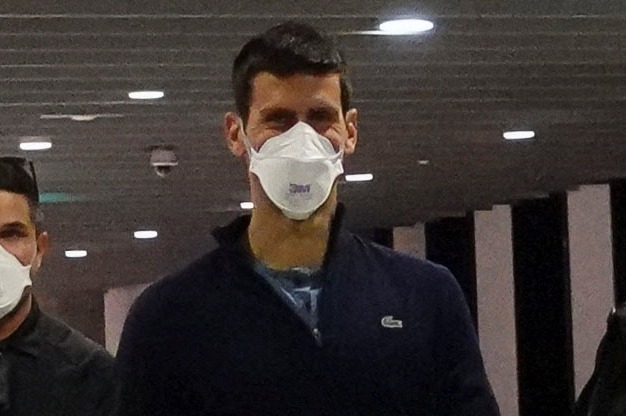Novak Djokovic, the renowned 24-time Grand Slam champion, has made startling claims about his experience during the 2022 Australian Open visa saga. Detained in a Melbourne hotel due to his unvaccinated status against COVID-19, a stance that clashed with Australia’s strict entry rules at the time, Djokovic alleges he was subjected to food poisoning, a claim he had never publicly revealed until recently. The incident, he asserts, led to severe health complications upon his return to Serbia, where tests revealed alarmingly high levels of heavy metals, including lead and mercury, in his system. This revelation adds another layer of complexity to the already controversial saga surrounding Djokovic’s visa cancellation and his subsequent exclusion from the tournament.
Djokovic’s assertion of food poisoning rests on his experience during the mandatory detention period he served in a Melbourne hotel housing asylum seekers. He describes feeling unwell and subsequently discovering, upon his return to Serbia, the presence of elevated heavy metal levels in his body. Known for his meticulous attention to diet and fitness, the Serbian tennis star expressed shock at the discovery, explicitly connecting his illness to the food consumed while in detention. He vividly recounted his suffering from flu-like symptoms, necessitating multiple interventions by an emergency medical team during his return journey to Europe. This claim, though yet to be independently verified, raises serious questions about the conditions within the detention facility and the potential health risks faced by detainees.
The Australian Open visa saga of 2022 ignited a firestorm of controversy, centering around Djokovic’s unvaccinated status and his subsequent attempts to enter Australia to compete in the prestigious Grand Slam tournament. Australian authorities, steadfast in their COVID-19 protocols, denied Djokovic entry, triggering a legal battle and sparking international debate about individual rights versus public health mandates. Djokovic’s detention, the subsequent court hearings, and his eventual deportation became a global news story, polarizing opinions on both sides of the vaccination debate. The recent allegation of food poisoning casts a new light on the ordeal, shifting the focus from the legal and ethical arguments to the potential health risks Djokovic faced while in detention.
While maintaining his stance on personal freedom of choice regarding vaccination, Djokovic has clarified that he was never opposed to vaccines themselves. He emphasizes his belief in the right to make informed decisions about one’s health, a right he felt was being compromised during the Australian Open saga. He maintains that his decision not to receive the COVID-19 vaccine was a personal one, rooted in his commitment to bodily autonomy. This stance, while respected by some, drew considerable criticism from others who viewed it as a disregard for public health guidelines during a global pandemic. The controversy underscored the tension between individual liberties and collective responsibility in navigating the unprecedented challenges posed by the pandemic.
Djokovic, despite the ordeal and the ensuing criticism, maintains a forward-looking perspective, emphasizing his commitment to the sport and his desire to compete. He acknowledges the impact of the Australian Open saga on his career, missing not only that tournament but also the US Open due to vaccination mandates. He has since recounted the emotional toll of these events, describing feelings of being ostracized and portrayed as a villain. Nevertheless, his focus remains on returning to competitive tennis and reclaiming his place among the sport’s elite. He expresses a renewed appreciation for the opportunity to play and a determination to overcome the challenges he has faced.
The Australian Department of Home Affairs has declined to comment on Djokovic’s allegations, citing privacy reasons. This lack of response leaves many questions unanswered, further fueling speculation about the circumstances surrounding Djokovic’s detention and the validity of his claims. The absence of an official statement from the authorities also underscores the sensitivity of the matter and the potential legal ramifications it could entail. As Djokovic continues his tennis career, the 2022 Australian Open saga remains a significant chapter, highlighting the complexities of navigating public health crises, individual freedoms, and the high stakes of international sport.











